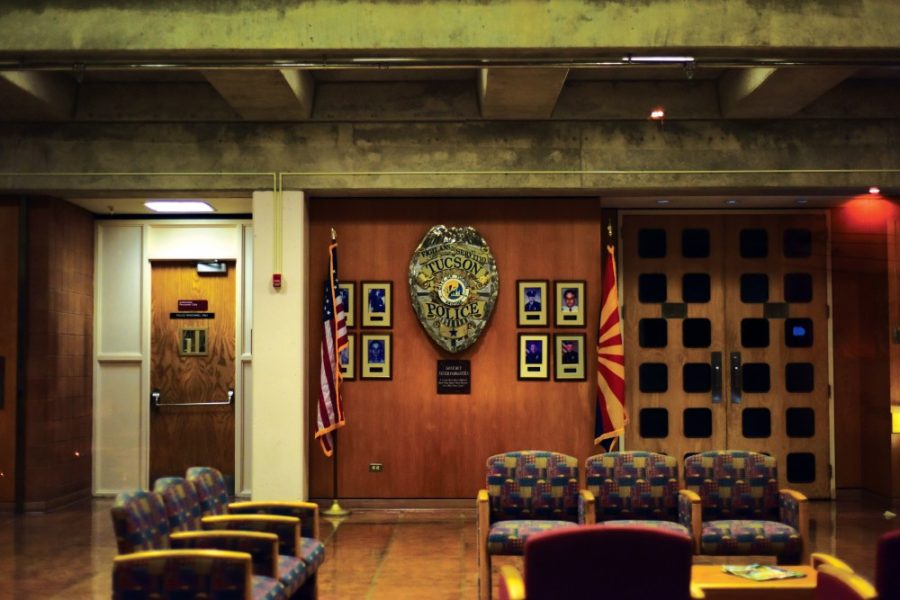The Tucson Police Department’s Mental Health Investigative Support Team works to make a positive impact in the community by helping the mentally ill through a preventative approach.
“The mission of our unit is to prevent crime and decrease the amount of incarceration for mental health clients by helping facilitate treatment,” said TPD Officer Dustin Dial. The MHIST unit was established after the Jan. 8, 2011 shooting, when a gunman opened fire on a Congress on Your Corner event at a Tucson Safeway. U.S. Rep. Gabrielle Giffords and 12 others were shot. Six people were killed that day.
After the shooting, “The general public and a lot of media outlets began asking the question, ‘Why didn’t the police know anything before the shooting?’ ” Dial said. Local law enforcement then began asking themselves if they could have done anything to prevent the shooting.
According to Dial, the answer would have been no because law enforcement has historically been responsive by nature.
“However, I think times are changing and the overall aspect of crime prevention, and the mentality behind it as well, is changing more towards a proactive approach more than ever before,” he added.
In a Gallup poll conducted in Sept. 2013, 48 percent of Americans believed that the failure of the mental health system to identify individuals who are a danger to others was to blame for mass shootings in the U.S.
Within the MHIST unit, checks and balances occur, such as doctor approvals and mental health court orders, before law enforcement gets involved.
The MHIST unit has also been involved in several high-profile cases that have prevented a possible church shooting and a kidnapping.
“We did that in a way where we combined both investigative law enforcement and mental health treatment,” Dial said.
In one instance, he said an individual was charged with felony stalking of multiple victims. The MHIST unit was able to get a mental health court order for the individual, who is currently in jail, and remove the individual’s guns from his possession.
“We were able to prevent what, based on the evidence, appeared to be a large-scale shooting at a church,” Dial said.
the TPD MHIST unit would also work with the University of Arizona Police Department in the event that a student could be a danger to his or herself or others. UAPD Sgt. Filbert Barrera said the department looks for certain signs that show students are “failing to thrive, such as not eating, sleeping, not engaging or not taking care of themself.” UAPD takes every situation case by case and makes decisions based on the facts and circumstances that are gathered and will call on the TPD for assistance if needed, according to Barrera.
The majority of individuals transported to hospitals for mental health treatment are transferred without the use of handcuffs, according to Dial. TPD has also taken risks with the MHIST unit, such as allowing MHIST officers to wear plain clothing rather than their uniforms to help individuals stay calm.
“We’re surprised every day how willing people are to talk to us when we say, ‘No one is in any kind of trouble, we’re with the mental health unit,’ ” Dial said.
The MHIST unit also uses unmarked vehicles. When an individual is transported, “[MHIST tells] them, ‘There are no lights on it, and there’s no marking on the side because this is nobody’s business but yours,’ ” Dial said.
Helping individuals with the support of the community “takes away that bad-guy mentality,” said Officer Darrell Hussman. “Now, calling the cops doesn’t mean somebody is getting in trouble, but that we’re here to help.”
MHIST is comprised of a captain, a sergeant, a detective and two field officers, all of whom go through special training.
“Crisis intervention training is so valuable,” Dial said. In addition to crisis intervention training, members of the unit are also required to become certified in Mental Health First Aid, which is a certification put on by the National Council for Behavioral Health, according to Dial.
“We get to be the side of law enforcement that is helping people,” Hussman said. “That is the most rewarding.”
If you or someone you know needs help, call the 24/7, community-wide crisis line at 520-622-6000.
Follow Amanda Oien on Twitter.









